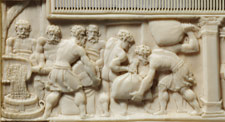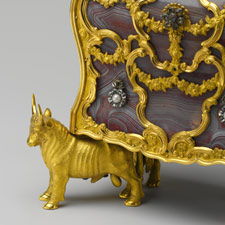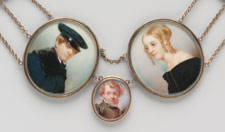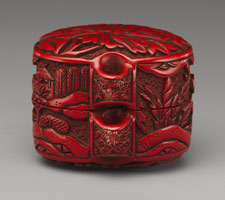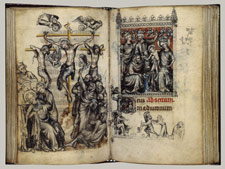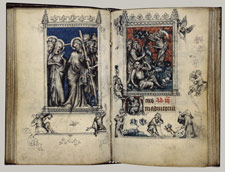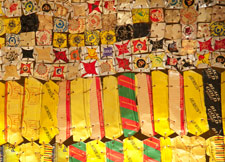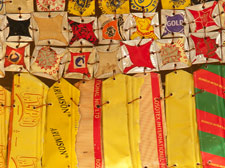New Connections appear every Wednesday. Sign up for a reminder.
Associate director Carrie Rebora Barratt looks for tiny works of art in the Museum's collection.
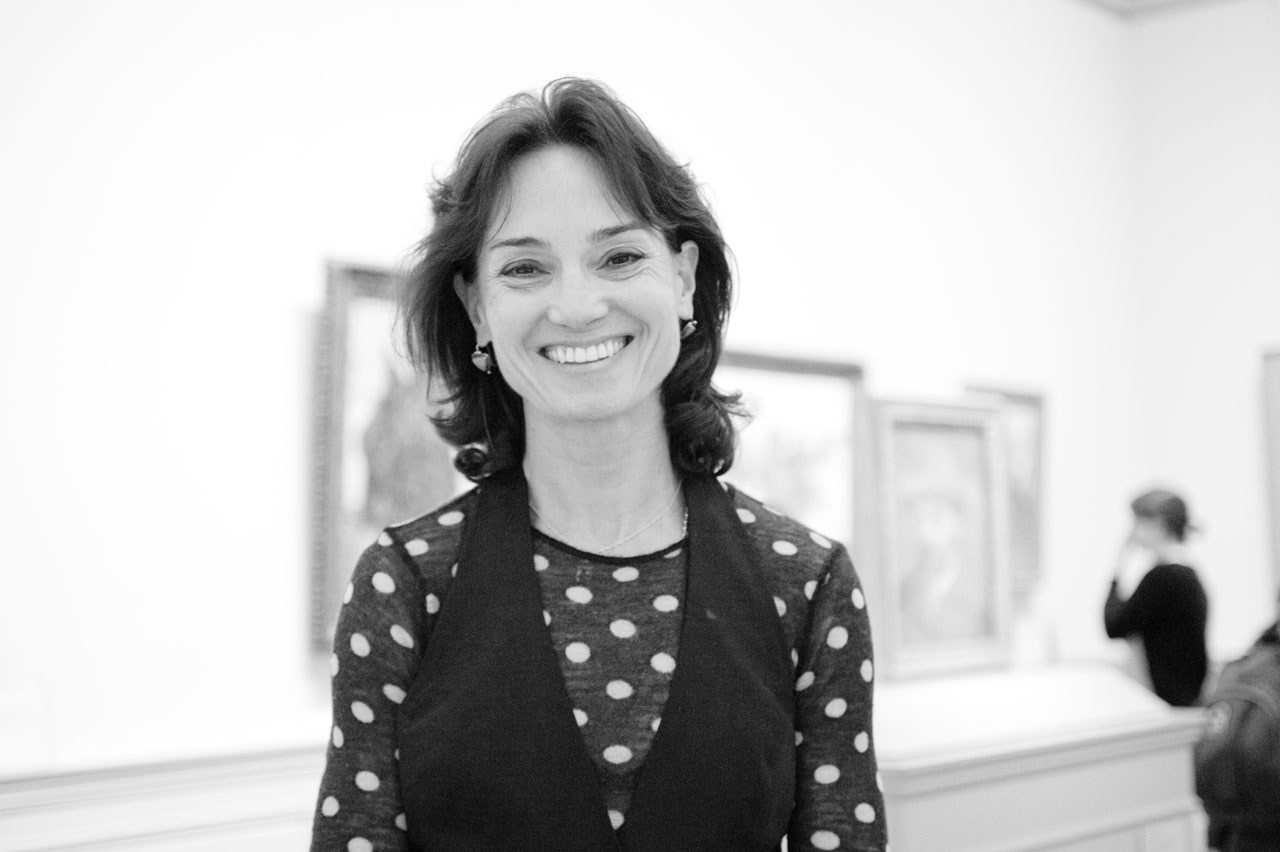 1280852
1280852 947947
947947 16501024
16501024 12421024
12421024 18951024
18951024 10671024
10671024 5801024
5801024 10241024
10241024 13791024
13791024 10181024
10181024 22391024
22391024 17391024
17391024 11541024
11541024 11541024
11541024 13181024
13181024 13671024
13671024 13391024
13391024 9101024
9101024 7871024
7871024 13831024
13831024 14051024
14051024 14251024
14251024 13741024
13741024 1280852
1280852
I'm Carrie Rebora Barratt. I'm Associate Director for Collections and Administration. One of the great pleasures of my work is the access it has provided, and responsibility for the collections at large.
I've always liked small things. Diminutive, tiny things have always been
much more appealing to me than large-scale things which everyone is meant to see. I always find that small things really
require careful study, quiet and
an intimacy with one's self in order to truly appreciate it.
As a child, I collected teeny, tiny, little animals
and the way that collection started was my mother would often take me out of school so that we could go to the museum, and the carrot that got me there
was that after looking at the Seurats and the Chinese bronzes and all of the wonderful things she wanted to see, we would go into the children's shop and I would get to pick something
to take home. And what I always picked was some teeny tiny animal derived from a Japanese netsuke, or
a small horse that was derived from a larger horse in the gallery. And even though I probably should have appreciated the bigger pieces or the actual works of art, what I always wanted was the thing that I could put in my pocket.
Historically, nine times out of ten, a small object was a token from one person to another. One of my favorite pieces in the collection is the Thomas Seir Cummings Mother's Pearls, the necklace that he made for his wife of all of their children. The necklace to me must have been endlessly more beautiful
and a more intimate representation of what they shared. To have placed each and every one of these children in a locket, the largest of which is barely an inch high, oh my God, such an extraordinary array of jewels that these children become.
The Japanese box with its beautiful landscape narrative that revolves around the outside of the box. It's so bright
and so compelling, the color of, the color of blood, the color of a beating heart, that would attract you, but to an object that is, that is so, so tiny and to think there would be something even tinier inside.
I love to look at small things and to think about the craftsmanship of hands and extraordinary eyesight
the degree of not only expertise but also clarity of vision and
dexterity that is required to make something small is just remarkable to me.
A very small watercolor on ivory that is surrounded by garnets of Jeremiah Lee, for his wife and eventually his daughters, is infinitely more interesting to me than the great, huge, larger-than-life portrait of him that was painted for his home in Marblehead, Massachusetts, so that the same man again who was master of his domain was also someone who, who was loved.
I like miniaturized versions of larger things, always thinking that sometimes things are better small. They're more refined, they're tighter. The Bolivian tunic is just beautiful to me because it looks like a Barbie could wear it. And I'm not really sure what its purpose would have been, but it captivates me for that sense of play that's in it, a sense that maybe someone, that artists make things as maquettes, as models for things they might be able to, you know, to make bigger sometime.
Once one begins walking through the museum like I do engaged in every little small thing I can find it also encourages us to look not only at small things
but to look closer at big things, because at the end of the day, big things
are comprised of small details, and that the closer inspection that you bring to something the more rewarding that it will be.
So whether it's a Greek vase or a large American painting, or a piece of ornate furniture, as you, as we go through the museum, you find that even big things are really rewarding
if you look at the details.
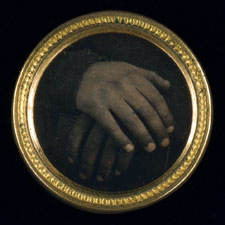 |
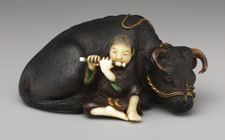 |
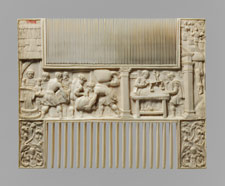 |
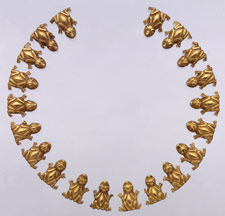 |
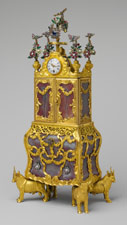 |
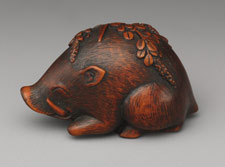 |
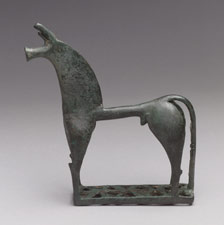 |
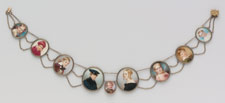 |
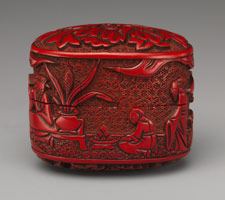 |
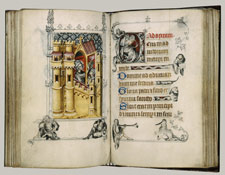 |
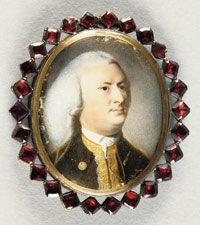 |
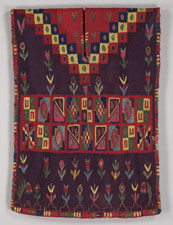 |
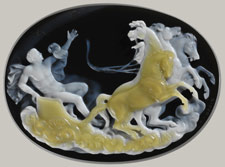 |
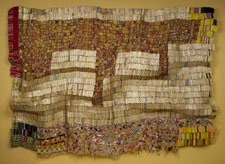 |
Works of art in order of appearanceLast Updated: June 22, 2015. Not all works of art in the Museum's collection may be on view on a particular day. For the most accurate location information, please check this page on the day of your visit. |
||
 |
Abolitionist Button 1840s–50s Unknown Artist, Unknown School Daguerreotype Diam. 5/8 in. (1.6 cm) Gilman Collection, Purchase, Joyce F. Menschel Gift, 2005 (2005.100.78) More information: The Collection Online Not on view
|
 PhotographsSecond Floor
PhotographsSecond Floor |
 |
Netsuke: Ox with boy playing flute 19th century Japanese Wood, ivory, metal H. 13/16 in. (2 cm), W. 1 3/4 in. (4.5 cm), D. 1 1/8 in. (2.9 cm) Gift of Mrs. Russell Sage, 1910 (10.211.780) More information: The Collection Online Not on view
|
 Asian ArtSecond Floor
Asian ArtSecond Floor |
 |
Double Comb: Scenes from the Story of Joseph More information: The Collection Online Not on view
|
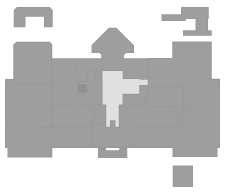 Medieval Art and The CloistersFirst Floor
Medieval Art and The CloistersFirst Floor
|
 |
Frog Ornaments 15th–early 16th century Mexico; Mixtec/Aztec Gold H. each 7/8 in. (2.1 cm) Gift of Jan Mitchell and Sons, in memory of Ellin Mitchell, 1998 (1998.39.1–.20) More information: The Collection Online Not on view
|
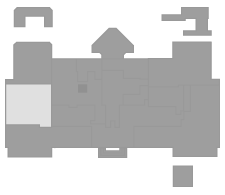 Arts of Africa, Oceania, and the AmericasFirst Floor
Arts of Africa, Oceania, and the AmericasFirst Floor |
 |
Miniature secretary incorporating a watch ca. 1766–72 Signed by James Cox (English) Case: agate, with gold mounts, gilded brass, pearls, and paste jewels set in silver; dial: white enamel 12 1/2 in. (31.8 cm) Gift of Admiral F. R. Harris, in memory of his wife, Dena Sperry Harris, 1946 (46.184a–c) More information: The Collection Online Not on view
|
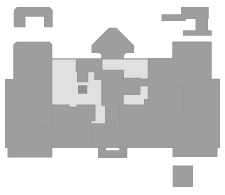 European Sculpture and Decorative ArtsFirst Floor
European Sculpture and Decorative ArtsFirst Floor |
 |
Netsuke: Boar resting on bush clover 19th century Japanese Wood H. 7/8 in. (2.3 cm), W. 1 9/16 in. (3.9 cm), D. 1 in. (2.5 cm) Edward C. Moore Collection, Bequest of Edward C. Moore, 1891 (91.1.989) More information: The Collection Online Not on view
|
 Asian ArtSecond Floor
Asian ArtSecond Floor |
 |
Statuette of a horse 8th century b.c.; Geometric Greek Bronze H. 6 15/16 in. (17.63 cm) Rogers Fund, 1921 (21.88.24) More information: The Collection Online Not on view
|
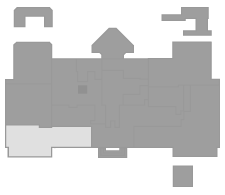 Greek and Roman ArtFirst Floor and Mezzanine
Greek and Roman ArtFirst Floor and Mezzanine |
 |
A Mother's Pearls (Portraits of the Artist's Children) 1841 Thomas Seir Cummings (American) Watercolor on ivory L. 17 1/2 in. (44.5 cm) Gift of Mrs. Richard B. Hartshorne and Miss Fanny S. Cummings (through Miss Estelle Hartshorne), 1928 (28.148.1) More information: The Collection Online Not on view
|
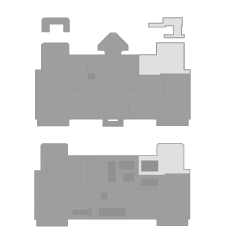 American Paintings and SculptureFirst and Second Floors
American Paintings and SculptureFirst and Second Floors |
 |
Inrô: Figures in a landscaped garden 18th century Japanese Red lacquer H. 1 9/16 in. (3.9 cm), W. 1 3/4 in. (4.4 cm), D. 1 1/4 in. (3.2 cm) Gift of Mrs. Russell Sage, 1910 (10.211.2081) More information: The Collection Online Not on view
|
 Asian ArtSecond Floor
Asian ArtSecond Floor |
 |
The Hours of Jeanne d'Évreux ca. 1324–1328 Jean Pucelle (French) Made in Paris Grisaille and tempera on vellum 3 1/2 x 2 7/16 in. (8.9 x 6.2 cm) The Cloisters Collection, 1954 (54.1.2) More information: The Collection Online Not on view
|

Medieval Art and The CloistersThe Cloisters at Fort Tryon Park |
 |
Jeremiah Lee ca. 1769 John Singleton Copley (American) Watercolor on ivory 1 1/2 x 1 1/4 in. (3.8 x 3.2 cm) Harris Brisbane Dick Fund, 1939 (39.174) More information: The Collection Online Not on view
|
 American Paintings and SculptureFirst and Second Floors
American Paintings and SculptureFirst and Second Floors |
 |
Miniature Tunic (Uncu) 17th–18th century Bolivia (Potosí) Cotton, camelid hair, silk, metal 14 1/2 x 11 in. (36.8 x 27.9 cm) Gift of Penny Righthand, in memory of Richard Levine, 2007 (2007.470) More information: The Collection Online Not on view
|
 Arts of Africa, Oceania, and the AmericasFirst Floor
Arts of Africa, Oceania, and the AmericasFirst Floor |
 |
The Fall of Phaeton third quarter of 19th century Adolphe David (French) Onyx 2 1/4 x 3 in. (56 x 76 mm) The Milton Weil Collection, 1940 (40.20.12) More information: The Collection Online Not on view
|
 European Sculpture and Decorative ArtsFirst Floor
European Sculpture and Decorative ArtsFirst Floor |
 |
Between Earth and Heaven 2006 El Anatsui (Ghanaian) Aluminum, copper wire Purchase, Fred M. and Rita Richman, Noah-Sadie K. Wachtel Foundation Inc., David and Holly Ross, Doreen and Gilbert Bassin Family Foundation and William B. Goldstein Gifts, 2007 (2007.96) More information: The Collection Online Not on view
|
 Arts of Africa, Oceania, and the AmericasFirst Floor
Arts of Africa, Oceania, and the AmericasFirst Floor |
© 2011 The Metropolitan Museum of Art |
||

